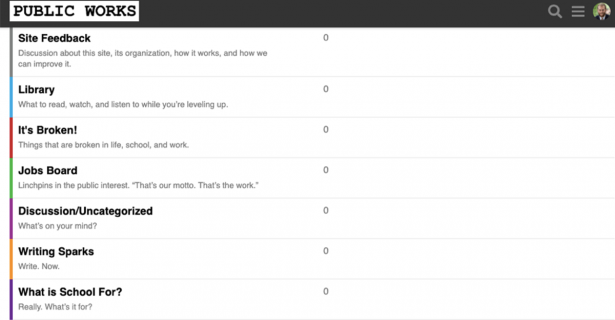When I started at Fletcher, in the fall of 2016, I had a pretty simple theory of change about graduate school: go to the right school, take the right classes (and do well), and get the right job afterward.
Over the past few years, however, I have become increasingly interested in what more students can do with and for each other to supplement our learning during our time at Fletcher. Each of us is on our own journey, of course, but it strikes me that we too often approach school as though the answers we are looking for are primarily to be found in the classroom or the career office.
The assertion I am testing with the Public Works platform is that we can build stronger and more useful peer-to-peer conversations during our time at Fletcher and beyond. Right now, the Fletcher network lives in multiple places: a student listserv, a jobs listserv, class-year alumni listservs, and social networks (professional and otherwise).
What might happen if, instead, we combined a curated jobs list, an extracurricular intellectual conversation, and a library of interesting resources all in one place?
To test this out, I have launched a Discourse site: a semi-private discussion board that is capable of all of those functions and more. It is more centralized and strategic than email, and—crucially—provides a safe place to learn through conversation. It is not for selling textbooks or toasters, nor is it for the kind of polished self-promotion typical on public networks.
Platforms like this are also proliferating in other sectors. The first I encountered were Seth Godin's Akimbo Workshops; since then, I have become aware of DIY MFA, the Personal MBA, the Farnam Street learning community, and the RadReads community, to cite just a handful of examples.
The basic intuition beyond each of these—especially the altMBA, the Personal MBA, and DIY MFA—is that, with minimal guidance, groups of thoughtful and committed people on similar journeys can teach each other much of what they are seeking to learn.
What Public Works offers, then, is a way for a similar conversation to start in the international and public affairs community. People starting businesses have a place to go with Akimbo. Aspiring authors have DIY MFA. And the investing and finance crowd has Farnam Street and RadReads. I have yet to see a similar opportunity for people like us, those interested in serving the public and I think the time is ripe.
Going to graduate school—especially a world-class one like Fletcher—is still an enormous opportunity. The classes, classmates, and career resources on offer here are some of the very best, yet, as the saying goes, none of us alone is as smart as all of us together. Building a peer-learning community like this might give us an opportunity to better make use of what we already know even as we take classes and pursue internships.
And that might turn out to be especially important as the world continues to change and students like us have to adjust our career plans with it. The old linear model—the one I showed up with three years ago—may no longer fit reality. If so, I would much rather we try to help each other respond versus all trying to figure it out on our own.

